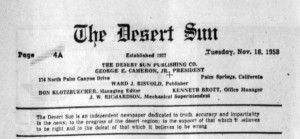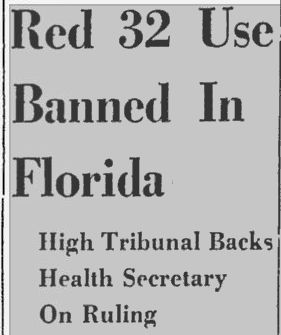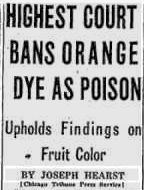
As a kid many moons ago, I was told there really aren’t any orange oranges. That is to say, they aren’t naturally orange, but are really green. Is this true? Not entirely, but it is partly true.
Many oranges do turn orange, at least in part. Temperature and sunlight levels are relevant. The green color present in some ripe fruits is chlorophyll.
Yet, when we go to the store, we see oranges that are at least mostly orange, usually completely so. Oranges, you see are often dyed.
Now you may have already known that. But did you know there once was a controversy over it? We transcribe a Palm Springs, CA Desert Sun news article for 1958.
The Supreme Court Rules
Washington (UPI) – The Supreme Court today weighed the question whether citrus growers must sell their oranges green.
The government contends a dye used by Texas and Florida growers to color the orange skins orange is poisonous.
But attorneys for Florida citrus growers told the court Monday that their industry will face “economic disaster” if barred from using a limited amount of the dye. They said the public just won’t buy oranges with greenish skin, the natural color of many ripe oranges.

The Health Education and Welfare Department contended that the dye should be banned completely.
The dye, a coal-tar product called “red-32,” was originally approved by the government as harmless for use in food. After later experiments with animals, the department removed the substance from the approved color list in 1955.
Then Congress passed a special law the following year permitting its use in coloring Florida and Texas oranges until next March 1.
J. Hardin Peterson, Lakeland, Fla., attorney for the Florida Citrus Exchange, contended that the department misinterpreted the word “harmless” as meaning “totally without harm.” He said almost any substance, including salt, could cause harm if a person consumed an enormous amount of it.

He also said the department had rejected a newly developed dye which they claim was 10 to 50 times as safe as red-32. But William W. Goodrich, the department’s assistant general counsel, said claims for the new dye and the safety of red-32 were exaggerated.
The department is appealing a decision of the Fifth Circuit Court of Appeals, directing it to certify as safe batches of red-32 for oranges. The arguments brought out that 63 percent of these fresh citrus fruits shipped from Florida are colored.
Orange Oranges Today
Today grocery store oranges are orange, not green. Dying is in use once again. But different dyes are used. One of these is Citrus Red Dye #2. The reader may find this Food and Drug Administration reference of use: CPG Sec. 550.625 Oranges – Artificial Coloring.
Note: You might also enjoy What is It Good For? Osage Oranges
References:
- The Desert Sun, Number 86, 18 November 1958: Supreme Court Today Weighs Question of Color of Oranges
- Daytona Beach Morning Journal – Dec 15, 1958: Red 32 Use Banned in Florida

I knew oranges were picked green but I thought that they then ripened to orange!